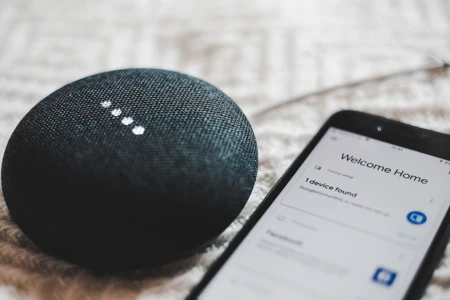In 2014, the number of internet-connected devices surpassed the world’s population.1
Since then, the popularity of Internet of Things (IoT) devices has skyrocketed. With devices such as Alexa and Google Home, the popularity and ease-of-use of these devices showed the average consumer the power of the IoT. Before this, IoT devices were seen as niche, complex, and expensive. 2014 seems like a lifetime ago now that we have devices that can order food for us and control our interconnected home entertainment systems.
What is a ‘smart home’?
A ‘smart home’ is a property that uses internet-connected devices, allowing homeowners remote control of systems such as security, lighting, heating or kitchen appliances.
Such devices make up the Internet of Things – using sensors within the devices (that connect to Wi-Fi or Bluetooth), they collect and analyse data in the physical world to automate everyday things we do in our homes, such as dimming the lights, altering the room temperature, or even ordering milk!
The concept behind a smart home is that such technologies may help make our lives a bit simpler and give us back some time for the everyday tasks we perform around the house.
What are smart home devices?
As with all new technology, there is, of course, some scepticism about the concept of the Internet of Things. Namely that it opens up our homes to potential hackers, and also gives the companies that develop the technology more control.
However, regardless of your view on smart home technology, what we do know is, there are now several internet-connected devices that you can use within your home to save you time and potentially money.
Here’s how they break down:
Heating and lighting
These are some of the most obvious areas where you can save money. It’s also a space where more technology is coming to the market, simply because of the environmental and cost-saving aspect in remotely controlling your heating or lighting. By being able to control and automate your utilities whilst away from your home, you could save yourself money on your energy bills (and be more environmentally-friendly at the same time).
As well as being able to remotely control your gas and electric, you can also track your spending a lot more easier with a smart meter. These devices can be used to better track your expenditure on these bills and also allows for easier meter readings. If you would like a smart meter in your property, contact your energy provider.
Security
A smart home security alarm allows you to control your alarm from an app remotely and can also connect the security hub to other devices such as CCTV. There are obvious benefits to using these devices, as you can be alerted to potential intruders whilst on the move, and also physically see your home. For example, there is a huge range of IoT security devices available today, such as doorbell cameras and smart locks.
Electrical appliances
Having smart electrical appliances in the home are down to customer preference - rather than the developer installing them. Take the smart fridge as an example. There are now several brands who have manufactured fridges which can automatically monitor stock within the fridge, connect to your favourite retailers to make automated repeat orders, or even use the screen on the fridge to display recipes or reminders.
Entertainment
Smart home entertainment systems are not necessarily going to save you money on your bills, but for some it could be a key lifestyle choice. If you’re aiming to turn your house into a smart home, it’s the logical next step.
Electric Vehicle (EV) Charging
If you have an electric vehicle and charging ports, you can add smart charging to your smart home features. Smart charging is a great way to save money on your electric bills. It works by only charging your vehicle at night and other off-peak hours. This uses cheaper energy rates and also eases strain on the power grid during hours in which energy is in high demand.2 Like other smart home devices, this can be controlled remotely.
Conclusion
There is a huge variety of smart home features that you could install in your property. As more and more developers are building homes that are geared towards technological advancements such as EV charging, it is definitely worth looking into buying a new build home for the future.
References and sources
1: The WIRED Guide to the Internet of Things, 2020
2: Smart charging for electric vehicles, 2023
Important information
Your home may be repossessed if you do not keep up repayments on your mortgage.
There may be a fee for mortgage advice. The actual amount you pay will depend on your circumstances. The fee is up to 1% but a typical fee is 0.3% of the amount borrowed.




